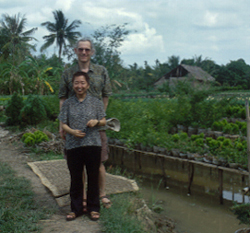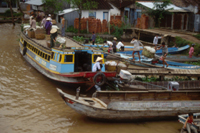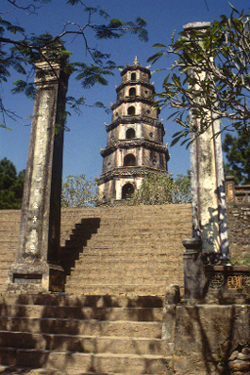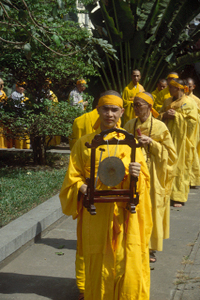 |
| Authors Mark W. McLeod and Nguyen Thi Dieu visit a famous local garden in Sa-dec province, southern Vietnam. |
Seeking to shatter stereotypes and share their enthusiasm for Vietnam, Mark McLeod, associate professor of history at the University of Delaware, and his wife, Nguyen Thi Dieu, associate professor of history at Temple University, have jointly written a book titled “Culture and Customs of Vietnam.”
The book, published by Greenwood Press, includes information on the history, culture and people of the southeast Asian nation, primarily known to Americans as a place of war and pain.
“Our book is aimed at the educated general reader and college student rather than a scholarly audience,” McLeod said. “Most of the books and articles that we write as scholars are concerned with theoretical questions and details of historical evidence and its interpretation. Such scholarly work is important, of course, because this is how new knowledge is discovered and older knowledge is reinterpreted or rejected. But the result is often mainly of interest to other scholars.
“The present book, on the contrary, is designed to provide for the general reader basic information about the Vietnamese culture that is factual and objective, yet sympathetic to Vietnamese perspectives.”
 |
| Workers in the southern Vietnamese province of Hoc-mon load a ferry boat with local fruits for export. |
Nguyen added, “When writing the book, my most important concern and desire were to convey to the readers my love of Vietnam, my native land. I wanted them to understand that beyond the images of war and poverty that decades of conflict have left in the minds of the outside world and in particular, of the U.S., there are a people and a land out there that are beautiful and alive and welcoming.
“The book shows the readers all the intricate layers that form the Vietnamese society past and present and allows them to understand the fine points of a culture without rendering them into stereotypes,” she said. “Hence, it is a work that any person with a curious and open mind could read and enjoy, be it a student, a busy professional, a Vietnam war veteran or a traveler. It is beyond being a simple travel book as it is meant to explain as well as to bring appreciation of a millennial civilization.”
For McLeod, it was the war that sparked his initial interest in Vietnam. “I have been interested in Vietnam since the late 1960s, when, as a high school student, I viewed photographs of the war in Life magazine and became aware of the debates over American involvement,” he said.
“In college, I began taking all the courses I could find about Asian history, politics and culture, finally specializing in Southeast Asian history at UCLA with a focus on Vietnam. This also gave me a chance to study the Vietnamese language at the U.S. Army’s Defense Language School in Monterey, Calif., which allowed a limited number of students from the University of California schools to enroll as civilians. By then, I was profoundly interested in Vietnamese history, culture and language, as well as retaining my original interest in recent political and military events.”
For Nguyen, the war was a part of her daily life. “When I left Vietnam for France, I was just a teenager in the 1970s and the country was still mired in war,” she said. “I am really a product of a wartime society for which the sound of explosions was more normal than that of silence. Above all, despite all that, I—like million others before me—carried inside images, tastes and smells that forever evoke happiness but also fear of war.”
The two met in France when McLeod was doing research in Paris in the 1980s. They married and moved to Los Angeles in 1988, accepting positions at the two universities on the East Coast in 1992.
 |
| The entrance to the Chua Thien Mu, or Heavenly Lady Pagoda, which is a Buddhist structure on the Perfume River in Central Vietnam near Hue City. |
Today, they live in Vietnam about four months out of the year, during summer and winter breaks from teaching, and spend most of their time in Ho Chi Minh City.
They also travel to other parts of the country to visit museums and historical sites, to meet scholars and to buy books and compact discs of the Vietnamese music that they both love and use in their courses. Also, McLeod has photographed all three regions of Vietnam for use in courses, exhibitions, slide presentations and book illustrations.
As an American in Vietnam, McLeod said he has always been very well received. “Vietnamese appreciate foreigners who take the trouble to learn to speak Vietnamese, so this really opens doors for me,” he said.
McLeod said one of his greatest pleasures is to mingle with ordinary people, buying “peasant” foods in the market and arguing with merchants about prices. There are no set prices for anything, he explained, and it is expected that a shopper will bargain.
McLeod said, “Americans often expect Vietnamese to be bitter about the wartime experience and some are, but most people view it more as a conflict of the past that was in any case between governments and not between peoples.”
It is helpful to remember, he added, that more than half of the current population of Vietnam has been born since 1975, and so the war to them is something that they study in school rather than a personal experience.
“The Vietnamese people, especially young people, want more interaction with individual Americans and with the United States, including economic and cultural contacts,” he said. “So does the government, the latter with the caveat that the U.S. should respect the current political system of government and not advocate for ‘human rights’ or democratization.”
McLeod said he is struck by the underdevelopment and poverty that continue to dominate the lives of most people and is likewise impressed by the incredible energy with which people exert themselves to improve their material situations now that the post-1987 reforms have opened up the economic system somewhat.
 |
| Buddhist monks in procession at the Vinh Nghiem Pagoda in Ho Chi Minh City. |
Those reforms centered on economic liberalization have liberated people’s creativity and energies, he said, and the resulting economic growth is improving and will continue to improve the material lives of most Vietnamese.
McLeod said he believes the U.S. can play a positive role in this process by opening its markets and extending loans and other forms of aid when asked. “European countries have been much more forthcoming in this regard, and I would like to see the U.S. take a leading role,” he said.
Politically, McLeod said the major question is whether the continuing economic growth will create a middle class that will demand democratization or at least an end to the petty harassment and corruption practiced by many Vietnamese officials.
“One must also be concerned that the continued unregulated economic growth will have negative effects on the environment,” he said. “This is already evident in major cities, where, for example, people have to wear face masks to keep airborne pollutants off their faces when traveling on bikes or motorcycles.”
Although Nguyen said she believes it is difficult to predict what the 21st century holds in store for Vietnam, she is certain of the resilience of its people. “Who can truly predict the future of any country particularly given the latest developments,” she said, “but if one were to take into consideration the cultural and historical patterns of Vietnam, one can safely say that it is a country that will always strive forward as the Vietnamese are a people that have survived untold hardships and have only begun to enjoy the fruits of peace.”
McLeod and Nguyen are currently focused on researching the history and culture of southern Vietnam.
His long-term projects include books on the Buddhist movement of 1963 that opposed the U.S.-supported Diem regime and a social history of Saigon/Ho Chi Minh City.
Nguyen is working on a general book on Vietnamese history as well as a monograph on Vietnamese identity formation from the 12th century to the present.
Feb. 25, 2002
|

